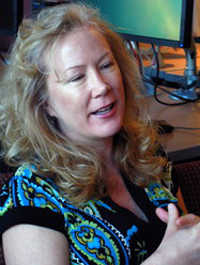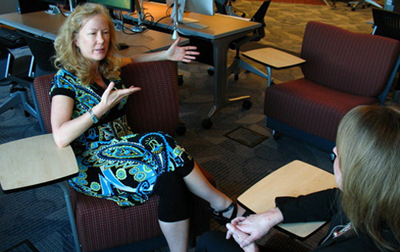UCSF School of Pharmacy Associate Dean for Teaching and Learning Outlines Vision
Tina Brock, BSPharm, MSPH, EdD, who recently became associate dean of teaching and learning in the UCSF School of Pharmacy, believes she is in the right place to take education to new heights of excellence.

Tina Brock, BSPharm, MSPH, EdD
“At UCSF, we are truly standing on the shoulders of giants, and never in my wildest dreams did I consider that I would be part of that tradition,” Brock says.
“There is a saying: ‘Be bold and mighty forces will come to your aid.’ Well, there are definitely mighty educational forces in the School of Pharmacy and across the UCSF community, and I am so looking forward to working together with them to evolve our curricula, thoughtfully and purposefully, for a new day in health care delivery and, ultimately, to make sure our patients achieve the best possible health outcomes.”
Brock, who joined the Department of Clinical Pharmacy faculty in July 2010, brings experience in both educational and clinical circles. She worked as a licensed pharmacist in community, hospital, and professional association settings and worked for a nongovernmental agency to improve access to and use of medicines globally. Brock was a lecturer in the Department of Practice and Policy at the University of London School of Pharmacy. Prior to that, she was based at the University of North Carolina at Chapel Hill, where she held the post of clinical associate professor and director of Student Services.
Understanding the Science of Education
Brock became interested in education as a science after her first stint as a teacher didn’t meet her own high expectations.
“I would read books about education to try to improve my skills even more, but this wasn’t enough for me. So my mentor suggested I look into the courses that were offered by our university’s School of Education. That did it — I was hooked!
Just as in any other science field, once I understood the theories behind education, I was able to use these to develop and test hypotheses. From these research results, I could predict behavior change. And how is that not fascinating? It became so clear — and so exciting to me — that the skills associated with good teaching could be learned. That meant they could also be shared.
Teaching is inherent in everything we do as pharmacists, and the skills are transferrable to so many other facets of our lives. These skills served me well, not only as a teacher, but also as a clinician and researcher.”
Brock is now taking the lessons she learned to ensure that the pharmacy school’s curricula prepare the best possible pharmacists and scientists.
“We want to make sure that the School of Pharmacy is pushing the envelope the way it did in 1966, when it established the first clinical pharmacy services,” she says.
“To ensure our graduates remain at the top once they leave here, it’s our responsibility to make sure our curricula are integrated, remain fresh and meaningful, and are presented in ways that reflect how young people actually learn best, based on the latest evidence from educational research. This might mean that we need to invest some discussion time in developing a UCSF-specific approach...but I have every confidence that the most innovative scientists and clinicians in the world can be the most innovative educators.”
Fostering Interprofessional Education
Among the key initiatives to ensure integration of meaningful education is by fostering interprofessional learning opportunities among faculty, students and trainees from all four professional schools, a concept that is gaining momentum at UCSF, Brock says.
“Again, this is another area in which UCSF is well positioned to excel. We’re on a dedicated health sciences campus that has an academic medical center and educational programs in pharmacy, nursing, dentistry, physical therapy, medicine, and the sciences. Plus we have a very strong library program supporting us. It’s a rare and precious combination.

Tina Brock, new associate dean of Teaching and Learning, talks with Susan Levings, associate dean, Planning and Communications, at the UCSF School of Pharmacy.
In reference to the professional schools in particular, research shows that there are fewer errors and patients have better outcomes when clinicians work together, sharing the responsibility for overall outcomes.
But how can clinicians learn to work together in the clinical setting if they’ve only passed each other in the hallways during their training? We haven’t optimized this strategy as yet, but the creation of the new UCSF Center for Innovation in Interprofessional Health Education is poised to change that. One of the great things about our PhD programs is that they’re already so integrated.”
One of the most exciting developments in education, Brock points out, is the opening of the Teaching and Learning Center at the UCSF library on the Parnassus campus.
“Some of the most powerful learning experiences I’ve witnessed since arriving in California are the interprofessional exercises that have been going on in UCSF’s Kanbar Simulation Center where students from each of our professional programs work together to solve problems for and communicate with standardized patients, who are actually actors trained to portray a specific situation,” Brock says. “Although this project is still in its infancy, it will be great to see the medium- and long-term results of this initiative and use that to create even more opportunities for true interprofessional learning.”
Brock earned a doctorate in education from the University of North Carolina at Chapel Hill, a master of science in pharmaceutical sciences, and undergraduate degrees in German and pharmacy, from the University of Mississippi.
Read the entire story on the UCSF School of Pharmacy website.
Photos by Eric Davila